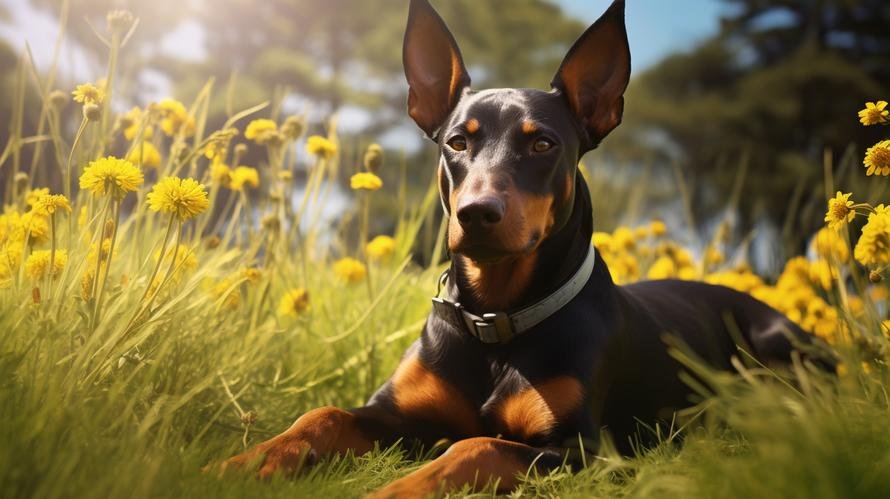Once there was a Doberman Pinscher named Rex. Now, what most people remember about Rex was his imposing appearance and large size. After all, with their lean, muscular bodies, and dark, glossy coats, Dobermans can seem intimidating to those who are unfamiliar with the breed. However, those who knew Rex understood that beyond his commanding presence, he was a devoted companion who would go to great lengths to protect his human family. But was Rex aggressive?
No, he was not. And here’s why.
Doberman Pinschers, like Rex, are often misunderstood as naturally aggressive dogs due to their historical usage as guard dogs. And a lot of this comes down to confusion between the terms ‘aggressive’ and ‘protective’. While being protective can certainly entail showing aggression under certain circumstances, it does not imply that the dog is inherently aggressive.
Originally, Dobermans were bred by a German tax collector named Louis Dobermann, who wanted a loyal, intelligent, and protective companion to accompany him during his perilous rounds. Unsurprisingly, these dogs needed to possess a protective streak to ensure their master’s safety. However, this protective instinct has often been misinterpreted as aggression, leading to a general misunderstanding that these dogs are inherently violent.
So, what is the truth? Are Doberman Pinschers really aggressive? In order to answer this question, we need to pay close attention to the Doberman’s personality and upbringing, rather than simply relying on stereotypical misconceptions.
First and foremost, Dobermans are known for their intelligence and loyalty. Ranked as the fifth-smartest dog breed in terms of obedience and working intelligence, there’s a reason why they’ve found a place in the military and police, search and rescue, and even as therapy dogs. These jobs require a high level of intelligence, obedience, and adaptability, which is something Dobermans excel at.
But here’s the catch: these highly intelligent dogs need constant mental and physical stimulation. They love challenges, crave companionship, and seek stimulating activities. An understimulated Doberman could develop behavioral problems, including signs of aggression, out of sheer frustration and boredom. Therefore, plenty of exercise and mental activities are a must to keep a Doberman’s mind and body sound.
Remember the good old saying, “A tired dog is a good dog?” It fits perfectly when it comes to managing a Doberman’s energy level.
Secondly, socialization and training are vital in shaping a Doberman’s behavior. When properly trained and socialized, Dobermans can be affectionate and sociable dogs who get along well with other pets and children. They can learn to control their protective instincts and only show their guarding traits when they sense a real threat.
On the flip side, if a Doberman is not adequately socialized, it could grow wary of strangers and other animals, which can lead to perceived aggression. Hence, it’s essential to expose a young Doberman to diverse people, environments, and situations to foster a balanced temperament.
Another factor that can contribute to a Doberman’s behavior is the way it’s treated by its human family. Dogs are incredibly intuitive and can pick up on their owner’s anxiety or fear, which can sometimes escalate their protective instincts, leading to aggressive behaviors. Hence, consistent, calm, and confident handling is key in managing a Doberman’s behavior.
So, is a Doberman Pinscher aggressive? The answer is no more than any other breed. Aggression in dogs is more often than not a result of the environment in which they are raised, the training they receive, and their treatment. Instead of labeling any breed as ‘aggressive’ as a rule, it is far more productive to understand that a dog’s behavior is majorly a reflection of their upbringing.
While Dobermans can be protective, labeling them as inherently ‘aggressive’ is simply a misunderstanding. Like Rex, each Doberman Pinscher has the potential to be a magnificent companion, embodying qualities such as loyalty, intelligence, and protectiveness. With good upbringing and sufficient mental and physical stimulation, your Dobie can grow to be as sociable and friendly as any other dog breed. After all, the key to a balanced dog is a balanced human.
So, give your Doberman the love, care, and training they deserve. And in return, you will gain a loyal, intelligent, and protective friend who will walk by your side, come what may.



